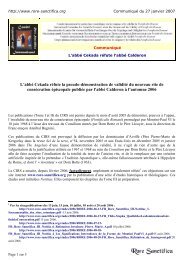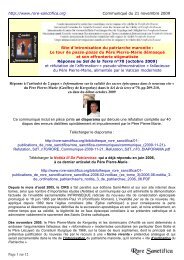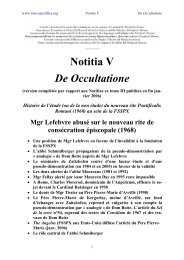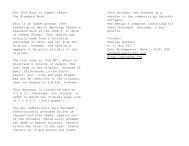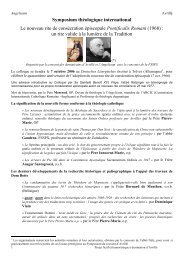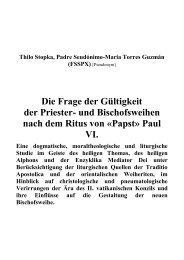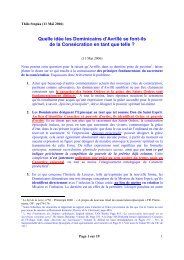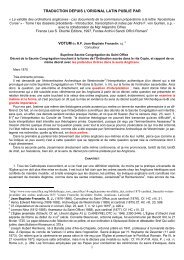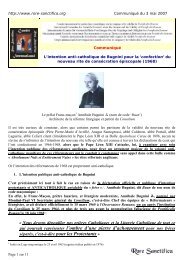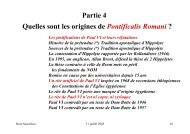die frage nach der gültigkeit der priester - Rore Sanctifica
die frage nach der gültigkeit der priester - Rore Sanctifica
die frage nach der gültigkeit der priester - Rore Sanctifica
Sie wollen auch ein ePaper? Erhöhen Sie die Reichweite Ihrer Titel.
YUMPU macht aus Druck-PDFs automatisch weboptimierte ePaper, die Google liebt.
120<br />
Dogma. 186 His view is that despite the fact that "most theologians, with St. Thomas, hold the<br />
opinion that a simple priest cannot validly administer the or<strong>der</strong>s of the Diaconate and Priesthood,<br />
even with plenary power from the Pope", the more probable view is that a simple priest<br />
can act as an extraordinary minister of the Sacrament of Or<strong>der</strong>.<br />
Unless one wishes to assume that the Popes in question were victims of the erroneous theological opinions<br />
of their times (this does not touch the Papal infallibility, because an ex cathedra decision was not given),<br />
one must take it that a simple priest is an extraordinary dispenser of the Or<strong>der</strong>s of Diaconate and<br />
Presbyterate, just as he is an extraordinary dispenser of Confirmation. In this latter view, the requisite<br />
power of consecration is contained in the priestly power of consecration as potestas ligata. For the valid<br />
exercise of it a special exercise of the Papal power is, by Divine or Church ordinance, necessary (p. 459).<br />
Even if it is accepted that these ordinations by abbots were valid they do not provide an argument<br />
in favour of the validity of the or<strong>der</strong>s of certain Protestant denominations conferred by<br />
men who had received priestly ordination but had not been consecrated as bishops (see p. 73).<br />
Given that a priest has the power to ordain, he could not do so validly without papal authorization.<br />
It is not even the case that the powers definitely conferred by the Sacrament of Or<strong>der</strong><br />
can always be exercised validly. The power to consecrate can always be exercised validly. An<br />
unfrocked or excommunicated priest can celebrate a valid Mass but would sin gravely in doing<br />
so. His Mass would be valid but illicit. But this is not the case with the power to absolve.<br />
There are a number of restrictions regarding the use of this Sacrament, and there are certain<br />
sins which the Pope and bishops have reserved to their own tribunals and which cannot be<br />
absolved validly by ordinary confessors unless the penitent is in immediate danger of death.<br />
<strong>der</strong> Sedisvakantis Rama Coomaraswamy 187 zitiert drei verschiedene päpstliche Bullen zu <strong>der</strong> Frage.<br />
Er ist aber so inkonsequent nicht zugeben zu wollen, daß das Prinzip Ecclesia supplet hier gelten<br />
könne. Das Suppletionsprinzip ist ja immer ein päpstliches Privileg. Wie auch immer, ich kann mir<br />
nicht vorstellen, daß drei Päpste geirrt haben sollen. Es mag sein, daß auch im Falle <strong>der</strong> Suppletion<br />
das gebundene Vermögen des Priester strikt an einen kanonischen Ritus gebunden bleibt, während<br />
<strong>der</strong> Bischof auch mit einem unkanonischen, aber sakramental gültigen Ritus weihen könnte.<br />
C'est, avant tout, la mise en lumière de trois importants documents pontificaux» :<br />
la bulle de Boniface IX du 1 er février 1400,<br />
celle de Martin V du 16 novembre 1427<br />
et celle d'Innocent VIII du 9 avril 1489,<br />
186 For a more detailed treatment of this question, see Fundamentals of Catholic Dogma by L. Ott, p. 369. In<br />
unserer Ausgabe von TAN-Books, 1974, ist es <strong>die</strong> Seite 459.<br />
187 http://perso.wanadoo.fr/thomiste/nouvrite.htm



